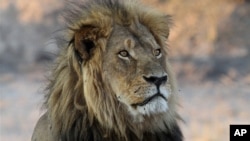Some call it the Cecil the lion effect.
A year ago, an American killed a lion in Zimbabwe in what authorities said was an illegal hunt, infuriating people worldwide and invigorating an international campaign against trophy hunting in Africa. Some conservationists, however, warn there are greater threats to Africa's beleaguered lion populations, including human encroachment on their habitats and the poaching of antelopes and other animals for food, a custom that deprives lions of prey.
The death of Cecil at Zimbabwe's Hwange National Park raised lions' profile on the "conservation radar," but most substantive steps in lion conservation since then have been directed against trophy hunting rather than bigger problems depleting lion numbers, said Luke Hunter, president of Panthera, a conservation group. Those measures include airline bans on the transport of parts of lions, rhinos, elephants and other wild animals shot in hunts.
In a report marking the anniversary of Cecil's death in early July 2015, Panthera and two other conservation groups – WildAid and WildCRU – estimated it would take at least $1.25 billion a year to effectively manage all protected areas in Africa where lions roam.
The groups advocated more protection for lion habitats, measures to stimulate tourism and economic growth unrelated to hunting, and the supply of alternative sources of protein to local people to reduce demand for wild animal meat. Restrictions on hunting should be tightened as more data emerges on whether trophy hunting of some threatened species is even sustainable, the report said.
Population declining
The number of lions in the wild in Africa has dropped by more than 40 percent to about 20,000 in the past two decades, according to estimates. Lion populations in West, Central and East Africa have dropped, though some conservation success has been recorded in the southern part of the continent.
Cecil, who wore a GPS collar and was being monitored by researchers, was killed in a protracted hunt in which he was, according to authorities, lured out of the wildlife park and initially wounded by an arrow. The death unleashed an extraordinary outpouring of anger at Walter Palmer, the American dentist who shot the lion, and other foreigners who have traveled to Africa to kill wildlife.
The hunting industry countered that it has a conservation role, channeling revenue from hunting back into wildlife areas that would otherwise end up as farms for livestock.
"Each [wildlife] population needs its own management plan,'' said Stewart Dorrington, who hosts bow and arrow hunters at a wildlife area three hours by car from Johannesburg. He said in a telephone interview that some anti-hunting activists favor a "blanket statement" about the ills of all hunting across Africa.
Dorrington, who does not have lions at his Melorani Safaris hunting operation, said many hunting areas in South Africa are struggling to get foreign clients at the moment.
U.S. clamps down
In December, the United States made it harder for American big-game hunters to bring a lion head or hide into the country, announcing that it would protect lions in Africa under the Endangered Species Act. At least 11,000 lions were logged in the trophy hunting trade from 2004 to 2013, according to the International Fund for Animal Welfare, a conservation group.
Conservationists are also increasingly concerned about the use of lion bones to replace tiger bones in traditional medicine in parts of Asia, as well as for use in ceremonies in some African countries.
Hunter, the Panthera president, said lions are relatively easy to spot in some wildlife parks and leave the impression that their overall population is plentiful. Lions are social, active during the day and accustomed to vehicles, he said.
"They're one of the top draw cards for tourists visiting Africa, in protected areas," said Hunter, noting the death of Cecil had generated massive awareness about their plight. "I hope that it doesn't go away."




